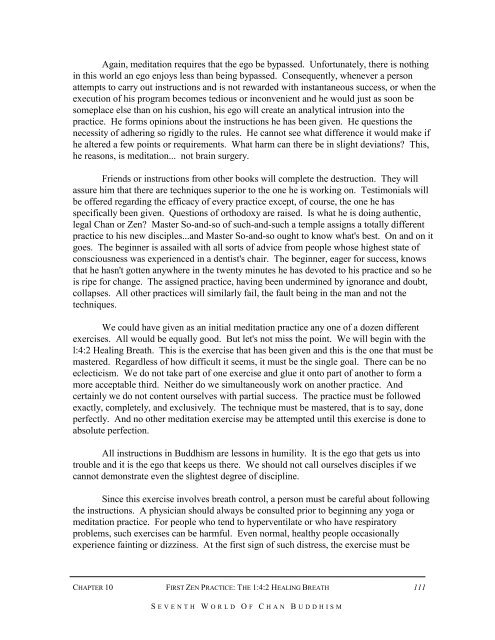seventh world of chan buddhism - Zen Buddhist Order of Hsu Yun
seventh world of chan buddhism - Zen Buddhist Order of Hsu Yun
seventh world of chan buddhism - Zen Buddhist Order of Hsu Yun
Create successful ePaper yourself
Turn your PDF publications into a flip-book with our unique Google optimized e-Paper software.
Again, meditation requires that the ego be bypassed. Unfortunately, there is nothing<br />
in this <strong>world</strong> an ego enjoys less than being bypassed. Consequently, whenever a person<br />
attempts to carry out instructions and is not rewarded with instantaneous success, or when the<br />
execution <strong>of</strong> his program becomes tedious or inconvenient and he would just as soon be<br />
someplace else than on his cushion, his ego will create an analytical intrusion into the<br />
practice. He forms opinions about the instructions he has been given. He questions the<br />
necessity <strong>of</strong> adhering so rigidly to the rules. He cannot see what difference it would make if<br />
he altered a few points or requirements. What harm can there be in slight deviations? This,<br />
he reasons, is meditation... not brain surgery.<br />
Friends or instructions from other books will complete the destruction. They will<br />
assure him that there are techniques superior to the one he is working on. Testimonials will<br />
be <strong>of</strong>fered regarding the efficacy <strong>of</strong> every practice except, <strong>of</strong> course, the one he has<br />
specifically been given. Questions <strong>of</strong> orthodoxy are raised. Is what he is doing authentic,<br />
legal Chan or <strong>Zen</strong>? Master So-and-so <strong>of</strong> such-and-such a temple assigns a totally different<br />
practice to his new disciples...and Master So-and-so ought to know what's best. On and on it<br />
goes. The beginner is assailed with all sorts <strong>of</strong> advice from people whose highest state <strong>of</strong><br />
consciousness was experienced in a dentist's chair. The beginner, eager for success, knows<br />
that he hasn't gotten anywhere in the twenty minutes he has devoted to his practice and so he<br />
is ripe for <strong>chan</strong>ge. The assigned practice, having been undermined by ignorance and doubt,<br />
collapses. All other practices will similarly fail, the fault being in the man and not the<br />
techniques.<br />
We could have given as an initial meditation practice any one <strong>of</strong> a dozen different<br />
exercises. All would be equally good. But let's not miss the point. We will begin with the<br />
l:4:2 Healing Breath. This is the exercise that has been given and this is the one that must be<br />
mastered. Regardless <strong>of</strong> how difficult it seems, it must be the single goal. There can be no<br />
eclecticism. We do not take part <strong>of</strong> one exercise and glue it onto part <strong>of</strong> another to form a<br />
more acceptable third. Neither do we simultaneously work on another practice. And<br />
certainly we do not content ourselves with partial success. The practice must be followed<br />
exactly, completely, and exclusively. The technique must be mastered, that is to say, done<br />
perfectly. And no other meditation exercise may be attempted until this exercise is done to<br />
absolute perfection.<br />
All instructions in Buddhism are lessons in humility. It is the ego that gets us into<br />
trouble and it is the ego that keeps us there. We should not call ourselves disciples if we<br />
cannot demonstrate even the slightest degree <strong>of</strong> discipline.<br />
Since this exercise involves breath control, a person must be careful about following<br />
the instructions. A physician should always be consulted prior to beginning any yoga or<br />
meditation practice. For people who tend to hyperventilate or who have respiratory<br />
problems, such exercises can be harmful. Even normal, healthy people occasionally<br />
experience fainting or dizziness. At the first sign <strong>of</strong> such distress, the exercise must be<br />
CHAPTER 10 FIRST ZEN PRACTICE: THE 1:4:2 HEALING BREATH<br />
S EVENTH W ORLD O F C HAN B UDDHISM<br />
111


